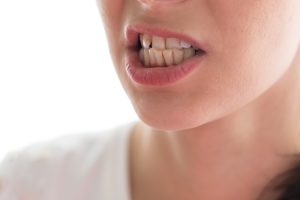 It goes without saying that your smile faces a number of factors that pose threats to its integrity. As a matter of fact, these concerns begin the moment you are born, and they never truly let up. While tooth decay, infection, disease, and more come to mind, it is also important to consider the not-so-common issues that can plaque your health as well, such as teeth-grinding. In today’s blog, your Houston, TX dentist takes an in-depth look at the common causes of chronic teeth-grinding, and why it is important to seek treatment to help protect your smile and oral health.
It goes without saying that your smile faces a number of factors that pose threats to its integrity. As a matter of fact, these concerns begin the moment you are born, and they never truly let up. While tooth decay, infection, disease, and more come to mind, it is also important to consider the not-so-common issues that can plaque your health as well, such as teeth-grinding. In today’s blog, your Houston, TX dentist takes an in-depth look at the common causes of chronic teeth-grinding, and why it is important to seek treatment to help protect your smile and oral health.
Stress or Anxiety
While you may have awoken with a sore jaw once or twice in your life, the truth of the matter is that this phenomenon is not a common occurrence. As a matter of fact, chronic teeth-grinding (also known as bruxism) is the result of a few different situations that indicate there is an underlying issue a hand. Though it may not seem like a big deal initially, the longer it goes on, the worse the situation will become.
Bruxism occurs when a person clenches his or her teeth together and proceeds to move the lower mandible from side to side. This causes the teeth to rub against each other aggressively and can lead to a number of significant issues. For example, bruxism can lead to increased chances of infection, damaged structures, and even TMJ disorder development. But what causes a person to grind in the first place?
One of the potential reasons you are clenching and grinding could be due to increased stress or anxiety. Indeed, these factors can cause your body to tense up and, subconsciously, clench and grind your teeth. For more information about this process, give our team a call today.
An Abnormal Bite
Another cause of bruxism could be an abnormal bite, crooked structures, or missing teeth. You see, your jaw alignment may unintentionally place extra stress on certain structures and, as a result, cause these structures to rub together. Fortunately, there are options that can help address an uneven smile, and our team would be more than happy to help. Give us a call to learn more about this process.
Sleep Apnea
Finally, your bruxism may be the result of the body’s inability to receive enough oxygen when you slumber. As this occurs, the airway may become blocked and the brain might send signals to correct the situation. When you grind your structures, this causes the muscles in the throat to tighten and alleviate some of the blockage. Unfortunately, it also causes damage to your smile, but an oral appliance may be able to help.
Schedule Your Appointment
To learn more about the potential causes of bruxism and what your treatment options are, contact SleepWell Houston in Houston, TX by calling 713-796-9600 to schedule your next appointment with our team today.










Recent Comments